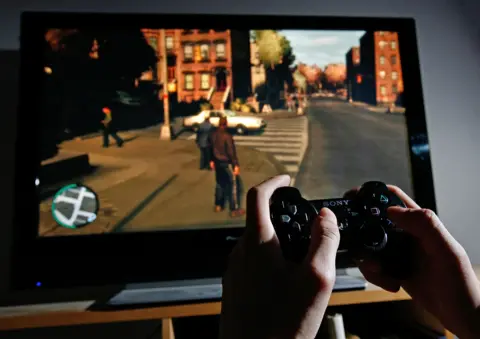Why games need to protect children from grooming
 Getty Images
Getty ImagesAre video games firms doing enough to protect children from online grooming?
Many games involve players communicating with people all over the world - which experts say makes children vulnerable to predators.
However a team of gaming and crime experts across the UK are set to investigate the issue in a new partnership which aims to safeguard young people from sexual exploitation.
It will be led by academics at Abertay University in Dundee.
The National Society for the Prevention of Cruelty to Children (NSPCC) and the National Crime Agency (NCA) have also joined the effort and will help design changes to games that should keep children safer online.
It will also include input from key games industry contacts.
Dr Darshana Jayemanne, of Abertay's school of design and informatics, is leading the project and said the partnership would focus on solutions to a number of challenges facing the industry.
He added: "Improving young people's safety and privacy while playing digital games is something we have been researching at Abertay for several years and it's fantastic to now be taking this forward with such a wide range of partners.
"There are a number of complex issues around child safety in gaming, and it is important that we work together."

What issues will be looked at?
The project was launched with a roundtable discussion at Abertay on Monday.
Representatives from London-based Space Ape Games, the InGAME (Innovation for Games and Media Enterprise) research and development project, and Beano Studios all attended.
Key issues discussed included the UK government's digital charter - a rolling programme of work which agrees on norms and rules for the online world.
It states that people have the same rights and expect the same behaviour online as they do offline.
The partnership has also examined new standards for games designers laid out by the Information Commissioner's Office (ICO), which was published earlier this year.
It covered issues such as switching off location tracking, parental controls and the avoidance of "nudge techniques" which can encourage children to provide unnecessary personal data.
At the time of publication, the ICO said its proposals reflected people's growing mistrust of social media and online services.
Attendees also exchanged views on the recent Commons report on immersive and addictive technologies.

Andy Burrows, NSPCC head of child safety online policy, said: "From our research, we know that children are at risk of being sexually groomed while playing games online, so the opportunity to work with other experts and those in the gaming industry on these issues is extremely positive.
"To protect children from coming to harm on these platforms, it is vital that safety measures are built into the games when they are designed - something we hope that can be achieved by working together."
Karen Hutchison, of the National Crime Agency, added: "Protecting children from online offenders is one of the NCA's most important objectives.
"We're very proud to be part of this games sector partnership which is dedicated to combating child sexual abuse and exploitation."
